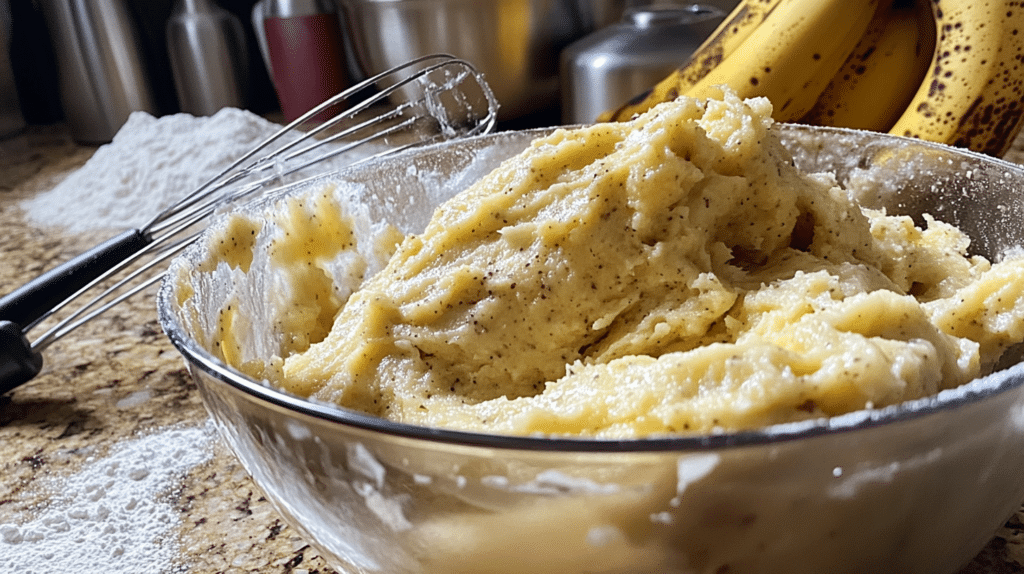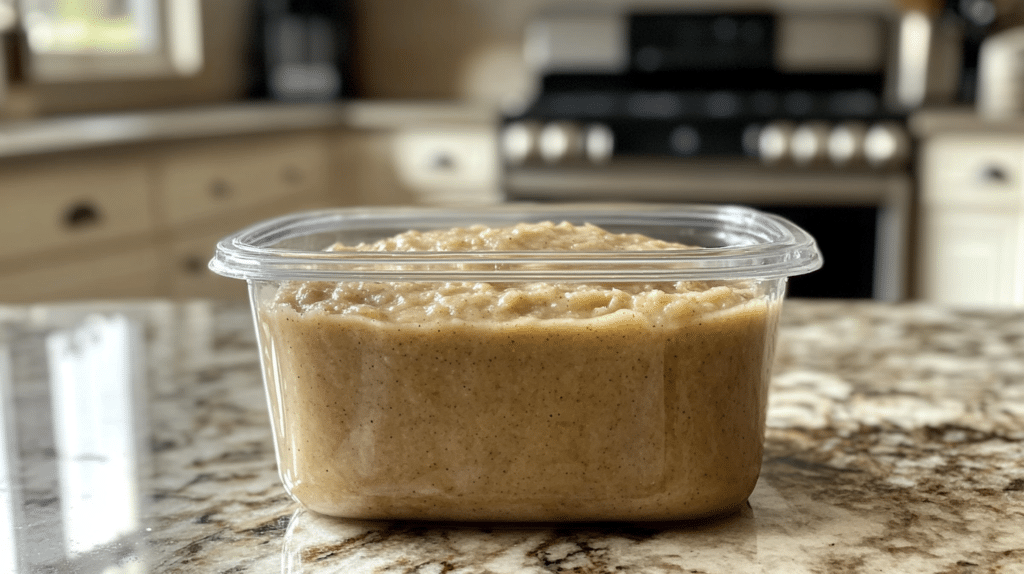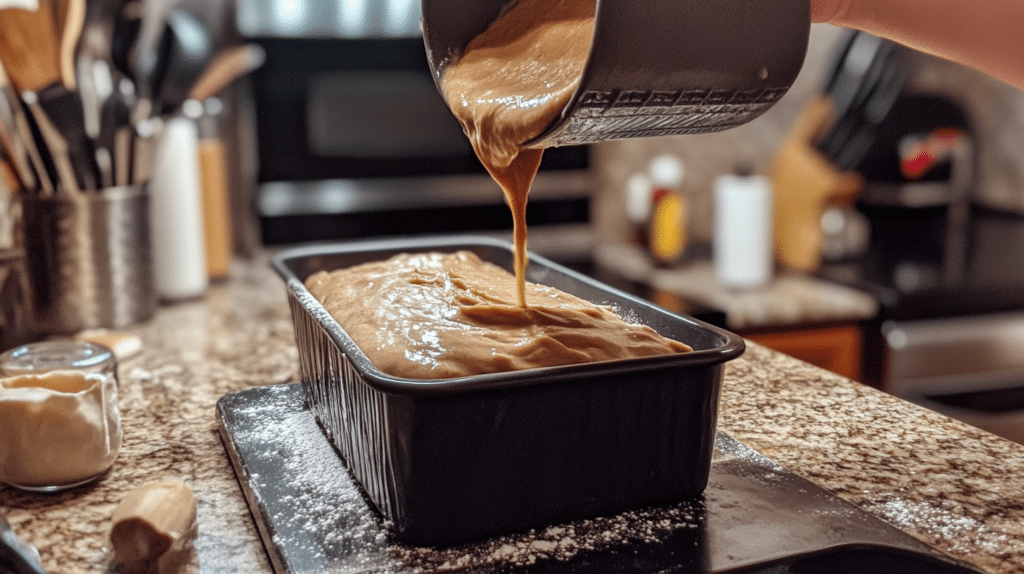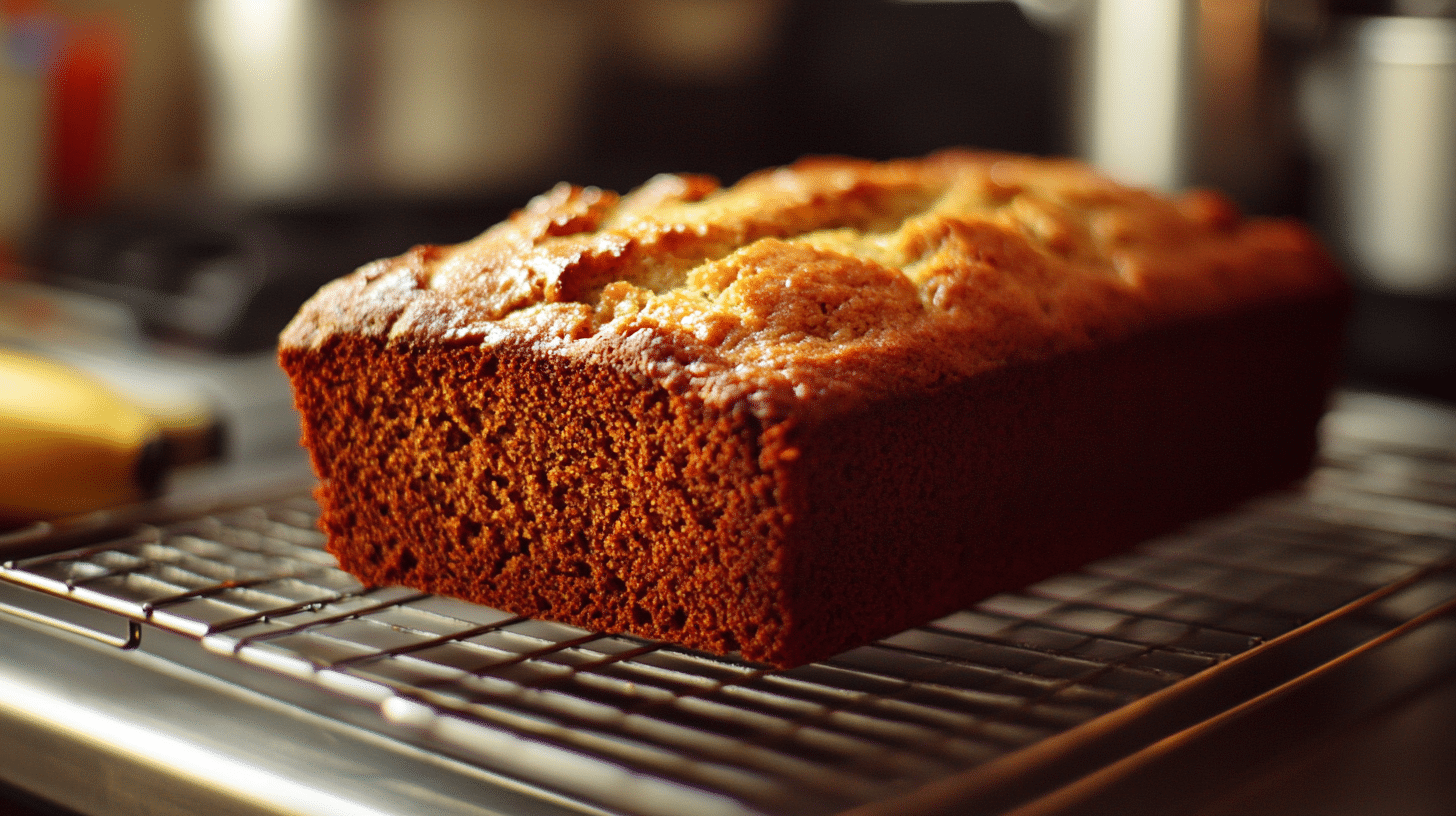Banana bread is a beloved comfort food, known for its moist texture, rich flavor, and versatility. Whether it’s a quick snack, a breakfast treat, or a dessert, it’s a recipe that many people turn to regularly. But what if you could mix the batter ahead of time and bake it later? Can you mix banana bread and bake it later, or does it negatively affect the outcome? In this article, we’ll explore whether it’s possible to prepare banana bread in advance and offer tips on how to get the best results.
Table of Contents
Why People Prefer Baking Banana Bread Later
Can you mix banana bread and bake later? This question arises when life gets busy, and finding time to bake fresh banana bread is a challenge. Loved for its simplicity and accessible ingredients, banana bread offers both comfort and convenience. Mixing the batter in advance and baking it later is an appealing option—let’s explore why many prefer this method.
1. Time-Saving Convenience
One of the most obvious reasons people look to mix banana bread batter ahead of time is to save time on baking day. Life can get busy, whether you’re juggling work, school, or family commitments. Mixing the batter the night before or even a few hours ahead of time means you can have banana bread ready to bake at a more convenient moment. This gives you flexibility, especially if you don’t have a large block of time to bake from scratch when the craving hits.
- Prep ahead: Mix the batter, store it in the fridge or freezer, and bake it when you have more time.
- Baking without the rush: It allows you to enjoy a freshly baked loaf without the pressure of mixing the ingredients and waiting for the bread to bake all in one go.
This time-saving advantage is particularly helpful for those who want to enjoy homemade banana bread but don’t have the luxury of spending an hour in the kitchen when the craving strikes.
2. Meal Prepping and Batch Baking
Another reason people want to bake banana bread later is for meal prepping or batch baking. For individuals who like to plan their meals ahead of time, having banana bread batter on hand that’s ready to bake can make morning routines or snack times much easier. Rather than baking a fresh loaf every time, people may choose to make larger batches of batter and store it for future use.
- Portion control: If you’re making a batch of banana bread, you can store individual portions of batter for smaller loaves or muffins, making it easy to bake just what you need.
- Batch baking: Making extra batter and freezing it can be a time-saver for busy families or anyone who enjoys baking in bulk. You can bake several loaves of banana bread over a few weeks without having to repeatedly make fresh batter.
For people who plan their meals around busy schedules, the ability to mix the batter in advance and bake it later can streamline the process, ensuring a quick and easy breakfast or snack is always on hand.
3. Making Banana Bread for Special Occasions
Banana bread is a popular choice for parties, gatherings, or as a gift. Many people prefer to prepare the batter ahead of time to ensure they can bake it fresh closer to the event. By mixing the batter in advance and storing it, they don’t have to worry about timing everything perfectly on the day of the event. This is especially true for:
- Holiday baking: Banana bread is often a go-to treat during the holidays, and being able to prepare the batter days ahead of time can free up your schedule to focus on other dishes.
- Gifts: People who enjoy baking banana bread for friends, family, or coworkers can prepare the batter, then bake it just before they plan to deliver it. This ensures the bread is fresh and smells heavenly when it’s gifted.
By mixing the batter and storing it, you can take the stress out of baking and still present a warm, delicious treat when needed.
4. Reducing Food Waste
Bananas, one of the key ingredients in banana bread, tend to ripen quickly, and if they’re not used in time, they can end up in the trash. Many home bakers use overripe bananas to make banana bread, but when the bananas start to brown or get mushy, it’s not always convenient to bake right away. Storing the banana bread batter for later use is a great way to reduce food waste.
- Bananas at peak ripeness: If you have extra overripe bananas that you don’t want to waste, mixing them into banana bread batter and storing it for later is an ideal solution.
- Banana preservation: When mixed into batter, overripe bananas can be preserved for a longer period, allowing you to use them at your convenience.
For anyone trying to minimize food waste or make the most out of leftover ingredients, preparing banana bread batter in advance offers a practical way to repurpose overripe bananas before they spoil.
5. Flexibility for Busy Households
In households with varying schedules, it can be difficult to find a time that works for everyone to sit down and bake. This is especially true for families with kids or roommates who may have different routines. Having banana bread batter prepared and waiting in the fridge means that someone can bake it at any time—whether in the morning before school, as an afternoon snack, or late in the evening when everyone’s home.
- On-the-go: In a busy household, some people may want their banana bread fresh in the morning, while others prefer it as an evening treat. Having the batter ready for baking at any time allows the flexibility to accommodate everyone’s preferences.
Being able to store banana bread batter ahead of time and bake it at the most convenient time makes it an easy treat to fit into any lifestyle.
Understanding the Ingredients in Banana Bread
Before we dive into the specifics of storing and baking banana bread batter later, it’s important to understand the basic ingredients that make up the dough. The main ingredients in banana bread are:

- Bananas: They provide moisture and natural sweetness. Over time, bananas can oxidize, turning brown, which may affect the color but not the taste.
- Flour: This acts as the base of the bread, helping it rise and giving structure.
- Eggs: Essential for binding the ingredients and providing a soft texture.
- Leavening agents: Typically, baking soda or baking powder is used. These chemical leaveners help the bread rise by releasing carbon dioxide when mixed with moisture and heat.
These ingredients all play a role in how banana bread turns out, and they can change over time if stored improperly. For example, baking soda loses its potency after a while, which can result in a denser loaf.
If you want to make sure your banana bread turns out perfectly, it’s important to follow the best storage practices. For instance, if you’re unsure about how to store banana bread batter, check out this helpful guide on King Arthur Baking that explains not only the recipe but also offers great tips on storing batters for later use.
Storing Banana Bread Batter: How Long Can You Keep It?
The biggest concern when storing Can you mix banana bread and bake later batter is how long it stays effective before baking. Generally, you can refrigerate it for up to 24 hours. However, over time, leavening agents like baking soda lose potency, potentially leading to a denser loaf.
For best results:
- Refrigerate banana bread batter if you plan to bake it within 24 hours.
- Freezing the batter is another option, especially if you want to keep it for longer periods (up to 3 months). The texture of the bread may be slightly altered, but the flavor will remain.
Effects of Storing Banana Bread Batter
While you can technically store the batter, there are a few effects to keep in mind:
- Leavening power decreases: As baking soda or powder reacts with moisture, it loses its ability to make the bread rise. For best results, don’t let your batter sit too long before baking.
- Texture changes: The batter may become thicker over time, and the banana flavor can become more pronounced, especially if stored in the fridge for an extended period.
- Bananas oxidize: Even though bananas provide the distinct flavor, they can oxidize and turn brown. This doesn’t affect the taste but might impact the appearance.
Best Methods for Storing Banana Bread Batter
If you plan to mix banana bread and bake later, here are the most effective storage methods to maintain the best texture and flavor:
- Refrigeration: Store batter in an airtight container in the fridge. You can safely refrigerate banana bread batter for up to 24 hours. Be sure to bring the batter back to room temperature before baking to ensure it rises properly.
- Freezing: For longer storage, freeze the batter. Divide the batter into portions, place it in freezer-safe bags or containers, and store for up to three months. When you’re ready to bake, simply defrost the batter overnight in the fridge and bake as usual.
Now that you know how to store banana bread batter, let’s dive into what happens when you bake it after a delay and what tips can ensure your banana bread comes out perfect.

Can You Freeze Banana Bread Batter?
If you’re looking to make banana bread well in advance, freezing banana bread batter is an excellent option. Freezing helps preserve the flavor and prevents the batter from oxidizing. However, it’s important to note that freezing can slightly alter the texture of the finished product, as the leavening agents lose some of their potency.
To freeze banana bread batter successfully:
- Portion the batter into the pan size you plan to use for baking.
- Use an airtight container or a freezer-safe bag to avoid freezer burn.
- Label and date the container so you know when it was frozen.
When you’re ready to bake, simply thaw the batter in the fridge overnight and bake it the next day. If the batter seems too thick after freezing, you can add a small amount of milk or water to loosen it.
Tips for Baking Banana Bread After Storing the Batter
Once you’ve stored your banana bread batter, there are a few key things to remember when it’s time to bake:
- Bring the batter to room temperature: This helps the leavening agents work more effectively, allowing the batter to rise properly.
- Don’t overmix: If the batter has been sitting for a while, avoid over-mixing it once you take it out of storage. Overmixing can lead to tough banana bread.
- Check your oven temperature: Make sure your oven is preheated to the correct temperature before placing the batter inside.
Following these steps will ensure that your banana bread turns out fluffy and delicious, even if the batter was stored for a while.
Frequently Asked Questions About Making Banana Bread
Can I mix banana bread and bake it the next day?
Yes, you can mix banana bread batter the night before and bake it the next day. However, keep in mind that the leavening agents may lose some of their effectiveness overnight. Refrigerating the batter can help, but it’s best to bake within 24 hours.
Can Banana Bread Batter Be Frozen?
Yes, you can refrigerate banana bread batter overnight. Just make sure it’s in an airtight container. The batter will be ready to bake the next day, but don’t wait longer than 24 hours.
Does banana bread batter get better with time?
Banana bread batter does not necessarily get better with time. While the bananas may deepen in flavor, the leavening agents will lose their strength, which could affect the texture and rise of the bread.
How long can I store banana bread batter in the fridge?
Banana bread batter can be stored in the fridge for up to 24 hours. After that, it may not rise as well when baked.

How do I know if my banana bread batter is still good to bake?
If your batter has been refrigerated, give it a quick stir before baking. If it seems too thick, you may need to add a splash of milk. Additionally, make sure the batter smells fresh and not overly fermented.
Conclusion: Should You Mix and Bake Later?
In conclusion, yes, you can mix banana bread and bake later, but following best practices ensures the best results. While storing the batter saves time, leavening agents lose potency over time. For optimal results, refrigerate the batter for up to 24 hours or freeze it for longer storage. Always let it reach room temperature before baking for a fluffy texture. For a great banana bread recipe, check out this step-by-step guide.
By following these tips, you can enjoy fresh banana bread without the rush! For more banana bread inspiration, check out our Hawaiian Banana Bread Recipe. You can also explore other delicious recipes like Cinnamon Roll Donuts or learn how to make the best Chicken Recipes on our homepage at Taste It Recipes.“

